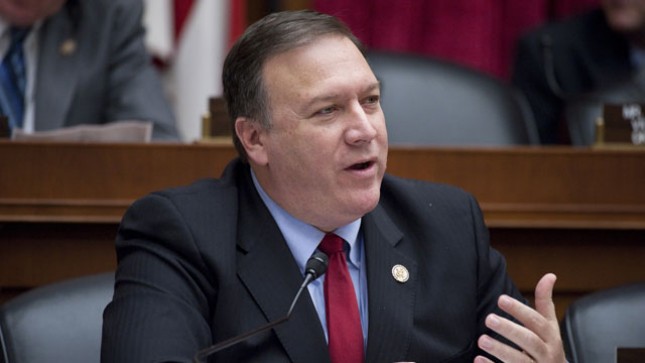PHOTO: Representative Mike Pompeo, one of three congressmen seeking a visa to visit Iran
Iran has used a visa request by three US congressmen for its latest wave of criticism of Washington, amid ongoing disputes about sanctions and implementation of the July 2015 nuclear deal.
Foreign Minister Mohammad Javad Zarif’s office issued a statement on Tuesday “strongly” rejecting the requests by Republican Representatives Mike Pompeo, Lee Zeldin, and Frank LoBiondo to visit Iran.
The legislators had said in early February that they wanted to visit to “inspect” nuclear sites, observe the recent elections to ensure they were “free and fair”, meet with American “hostages” — presumably Iranian-Americans in detention and, if possible, the long-missing former FBI agent Robert Levison, and receive “briefings” from the Revolutionary Guards on January’s brief detention of American sailors and on ballistic missile tests.
The three Representatives are critics of last summer’s nuclear deal.
The Foreign Ministry declared on Tuesday that the nuclear agreement empowers only the International Atomic Energy Agency to monitor its implementation. It then turned on new US restrictions, with Congress mandating that recent travellers to Iran are ineligible for the Visa Waiver Program:
Surely it is ironic that you believe that going to Iran would “radicalize” and turn citizens of all other countries into “potential security risks” for the United States; but you still seek to visit Iran and believe that such a visit will have no such radicalizing effect on you.
The Ministry concluded, “In sum, we consider your visa request to have been a publicity stunt and not an appropriate request to visit a sovereign country; and it has, and will continue to be, treated in that spirit.”
“A Crushing Response”
Iranian media went farther to proclaim a “victory” amid the Supreme Leader’s denunciations of the “dishonest” US — effectively warning the Rouhani Government not to pursue its foreign policy of “engagement” through links with America — over the past week.
Fars News, the outlet of the Revolutionary Guards, declared a “slam dunk” and a “strong and crushing response that could receive much applause from across the political spectrum at home”.
The visa furor came hours after the pointed intervention of Speaker of Parliament Ali Larijani to reinforce the Supreme Leader’s anti-American line.
Larijani proclaimed that recently-released documents featured by the BBC, including communication in January 1979 between the Islamic Republic’s founder Ayatollah Khomeini and US President Jimmy Carter, are “forgeries” designed to show that Iran and the US have good relations.
The allegation is false: the Khomeini-Carter exchange has been known for decades, both inside Iran and among Western analysts and scholars. The memoranda were used in the 1980s to punish politicians, including with death sentences, who had fallen out with the regime.
However, that does not stop Fars from extending Larijani’s comments this morning. It tries to give the story legitimacy through a University of Tehran academic, Seyed Mohammad Marandi, who insists that the BBC is trying to “instill the futility of resistance” among Iranians.
The Congressmen Respond
On Wednesday, the three Congressmen each responded to the rejection.
Pompey denounced “this absurd letter”, claiming it was “an attempt to distract from some of the Ayatollah’s far more dramatic ‘publicity stunts’ such as writing ‘Israel must be wiped out’ on ballistic missiles, plotting to blow up a restaurant in Washington, D.C., and kidnapping American sailors on the day of the [President’s] State of the Union [address]”.
LoBiondo said the reply was “deeply disappointing, though not surprising” with its “insults and deflections” and claimed that it showed “President Obama’s ‘new era of openness and cooperation’, as sold to the American people and the world, is a farce”.
Zeldin said the “shameful response” showed Iranian officials “fear the consequences of honesty”. He promised a change in US approach with Obama’s departure from the White House: “January 2017 will be here soon enough”.

